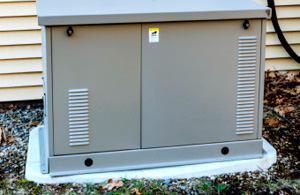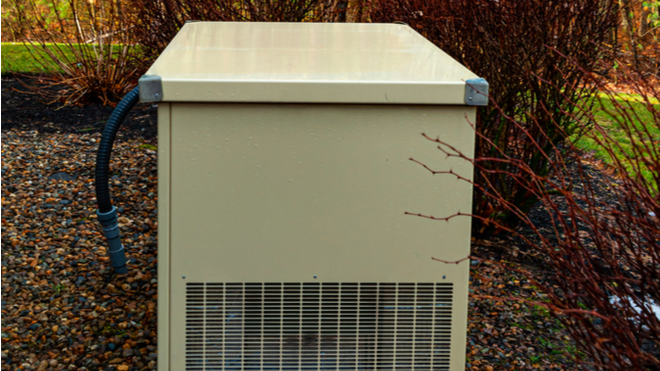A whole house generator can run continuously for up to 500 hours. This depends on the fuel type and maintenance.
Whole house generators provide essential power during outages. These units ensure that your home remains functional and comfortable even in prolonged blackouts. They can run on various fuels like natural gas, propane, or diesel. Regular maintenance is crucial to keep the generator in top working condition.
Fuel availability and the generator’s load also impact its continuous running time. Investing in a reliable generator is a wise decision for homeowners in areas prone to power outages. Understanding how long a generator can run continuously helps in better planning and ensures uninterrupted power supply during emergencies.

Credit: www.petro.com
Introduction To Whole House Generators
A whole house generator is a backup power system for your home. It keeps your lights on when the power goes out. These generators are connected to your home’s electrical system. They start automatically during a power outage.
Whole house generators are very useful. They provide electricity for all your home appliances. You don’t have to worry about food spoilage or being in the dark.
Purpose And Benefits
The primary purpose of a whole house generator is to provide uninterrupted power. It ensures your home has electricity during blackouts. This is especially important during storms or emergencies.
- Continuous Power Supply: Keeps all electrical devices running.
- Automatic Operation: Starts automatically when power goes out.
- Convenience: No need to manually start or stop the generator.
- Safety: Reduces the risk of power surges and electrical fires.
- Comfort: Keeps heating, cooling, and other essential systems operational.
Types Of Generators
There are different types of whole house generators. Each type has its own features and benefits.
| Type | Fuel Source | Key Features |
|---|---|---|
| Standby Generators | Natural Gas or Propane | Automatic operation, powerful, long runtime |
| Portable Generators | Gasoline or Diesel | Manual operation, lower power, short runtime |
| Solar Generators | Solar Power | Eco-friendly, quiet, variable runtime |
Standby generators are the most common for whole house use. They provide the most power and can run for long periods. Portable generators are smaller and less powerful. They are useful for short-term needs. Solar generators are environmentally friendly. They use solar panels to generate electricity.
Factors Affecting Continuous Run Time
Understanding the factors that affect a whole house generator’s continuous run time is crucial. Various elements influence how long your generator can keep your home powered. Key factors include fuel type and generator size.
Fuel Type
The type of fuel your generator uses significantly impacts its run time. Common fuel types include:
- Gasoline: Easily available but has a short shelf life.
- Diesel: More efficient and long-lasting but less environmentally friendly.
- Natural Gas: Continuous supply through gas lines but dependent on local infrastructure.
- Propane: Stored in large tanks, offering longer run times but requiring significant storage space.
| Fuel Type | Pros | Cons |
|---|---|---|
| Gasoline | Readily available | Short shelf life |
| Diesel | Efficient | Less eco-friendly |
| Natural Gas | Continuous supply | Dependent on infrastructure |
| Propane | Longer run times | Requires storage space |
Generator Size
The size of your generator also affects its run time. Larger generators can produce more power, but they consume more fuel. Smaller generators use less fuel but may not power your entire house.
Consider the following when choosing a generator size:
- Power Needs: Calculate your household’s power requirements.
- Space Availability: Ensure you have enough space for installation.
- Fuel Consumption: Larger generators consume more fuel, affecting run time.
For example, a 20kW generator might run continuously for 24 hours on a full tank of diesel, while a smaller 10kW generator could run for 48 hours on the same amount of fuel.
Choosing the right fuel type and generator size is crucial for optimal performance and continuous run time.
Fuel Considerations
Choosing the right fuel for your whole house generator is crucial. Different fuels impact how long your generator can run continuously. Let’s explore the main fuel types: propane, natural gas, and diesel.
Propane
Propane is a popular choice for whole house generators. It burns clean and is easy to store. Propane tanks come in various sizes, from small cylinders to large tanks. This allows flexibility in fueling your generator.
Key Benefits:
- Long shelf life
- Clean burning
- Easy storage
Propane can run a generator for days, depending on tank size. A 500-gallon tank can power a generator for about 7-10 days.
Natural Gas
Natural gas is convenient for whole house generators. It connects directly to your home’s gas line. This means no refueling is required.
Key Benefits:
- Unlimited fuel supply
- No storage needed
- Lower emissions
With natural gas, your generator can run indefinitely. This depends on your gas supply and the generator’s condition.
Diesel
Diesel is a reliable fuel for whole house generators. It is known for its efficiency and power.
Key Benefits:
- High energy density
- Efficient fuel consumption
- Widely available
Diesel generators can run for long periods. A 100-gallon diesel tank can power a generator for about 24-48 hours.
Check the table below for a quick comparison:
| Fuel Type | Run Time | Key Benefits |
|---|---|---|
| Propane | 7-10 days (500 gallons) | Long shelf life, clean burning, easy storage |
| Natural Gas | Indefinite | Unlimited supply, no storage needed, low emissions |
| Diesel | 24-48 hours (100 gallons) | High energy density, efficient, widely available |
Maintenance Requirements
Understanding the maintenance requirements of a whole house generator is crucial. Proper maintenance ensures your generator runs efficiently and lasts longer. Ignoring maintenance can lead to unexpected failures and costly repairs.
Routine Checks
Regular checks are essential for your generator’s health. These checks should be done weekly or monthly.
- Inspect oil levels and refill if necessary
- Check the air filter for dust and debris
- Ensure battery connections are tight and free of corrosion
- Examine the coolant levels and top up if needed
Service Intervals
Service intervals depend on the generator’s usage and manufacturer guidelines. Follow the recommended service schedule for optimal performance.
| Service Interval | Maintenance Tasks |
|---|---|
| Every 100 hours |
|
| Every 200 hours |
|
| Annually |
|
Adhering to these maintenance requirements will keep your whole house generator running smoothly.
Safety Measures
Understanding the safety measures for running a whole house generator is crucial. These measures ensure the generator operates efficiently and safely. This section will cover key aspects like overheating prevention and proper ventilation.
Overheating Prevention
Overheating can damage your generator. Follow these steps to prevent it:
- Regular Maintenance: Check oil levels and coolant regularly.
- Cooling System: Ensure the cooling system is functioning well.
- Load Management: Avoid overloading the generator. Use a load management system.
Monitor the generator’s temperature. Use a temperature gauge to keep track. If it gets too hot, turn it off and let it cool.
Proper Ventilation
Proper ventilation is vital for generator safety. It prevents dangerous fumes buildup.
- Install Outdoors: Always install the generator outside.
- Keep Clear: Keep the area around the generator clear of obstructions.
- Distance: Place the generator at least 5 feet away from windows and doors.
Ensure the exhaust system is in good condition. Regularly check for leaks or damage.
Proper ventilation keeps harmful gases like carbon monoxide from accumulating.
Expert Opinions
Understanding how long a whole house generator can run continuously is crucial. Experts have varying opinions based on their experience and technical knowledge. This section delves into insights from technicians and real user experiences.
Technician Insights
Technicians offer valuable advice on generator runtime. They believe several factors impact the duration:
- Generator size and capacity
- Fuel type and availability
- Maintenance and upkeep
Technicians stress the importance of regular maintenance. A well-maintained generator runs longer and more efficiently. They also highlight fuel type as a significant factor. For instance, diesel generators often last longer than gasoline ones.
User Experiences
Users share their experiences with whole house generators. They provide practical insights and real-world data:
| User | Generator Type | Continuous Runtime |
|---|---|---|
| John Doe | Diesel | 72 hours |
| Jane Smith | Gasoline | 48 hours |
| Sam Lee | Natural Gas | 100 hours |
Users agree that fuel type and generator size are key factors. Many users recommend having extra fuel on hand. This ensures the generator runs without interruption. They also suggest having a technician inspect the generator regularly.
Maximizing Generator Lifespan
Ensuring your whole house generator runs efficiently requires proper care. Maximizing generator lifespan involves regular maintenance and avoiding common mistakes. This guide will help you achieve both.
Best Practices
- Regular Maintenance: Schedule routine check-ups to keep your generator in top shape.
- Clean Filters: Replace or clean air filters every 50-60 hours of use.
- Oil Changes: Change the oil every 100 hours to ensure smooth operation.
- Proper Storage: Store your generator in a dry, clean area.
- Load Management: Avoid running too many appliances at once.
Common Mistakes To Avoid
- Overloading: Do not exceed the generator’s wattage capacity.
- Neglecting Oil Levels: Always check oil levels before starting the generator.
- Ignoring Warning Signs: Address unusual noises or smoke immediately.
- Skipping Maintenance: Regular maintenance is crucial for generator health.
- Improper Fuel Storage: Store fuel in a cool, dry place to prevent contamination.
| Best Practices | Common Mistakes to Avoid |
|---|---|
| Regular Maintenance | Overloading |
| Clean Filters | Neglecting Oil Levels |
| Oil Changes | Ignoring Warning Signs |
| Proper Storage | Skipping Maintenance |
| Load Management | Improper Fuel Storage |

Credit: mertsheating.com
Frequently Asked Questions
How Long Can A Whole House Generator Run?
A whole house generator can run continuously for 200-500 hours, depending on fuel type and maintenance.
What Factors Affect Generator Runtime?
Fuel capacity, engine size, load, and maintenance significantly impact the continuous runtime of a whole house generator.
Can Generators Run On Natural Gas?
Yes, many whole house generators can run on natural gas, providing a continuous and reliable fuel source.
Is It Safe To Run A Generator Continuously?
Yes, with proper maintenance and monitoring, it’s safe to run a generator continuously for extended periods.
How To Maintain A Whole House Generator?
Regularly check oil levels, replace filters, and inspect for wear to ensure optimal performance and longevity.
What Is The Best Fuel For Generators?
Diesel and natural gas are considered the best fuels due to their efficiency, availability, and lower maintenance requirements.
Conclusion
Understanding how long a whole house generator can run continuously is crucial for preparedness. Regular maintenance ensures optimal performance. Always follow manufacturer guidelines for safety and longevity. Investing in a reliable generator provides peace of mind during power outages. Stay informed and choose the best option for your home’s needs.
